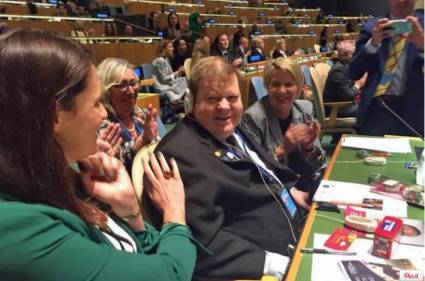Our Work
In Memory of Sir Robert Martin
How Self-Advocates Can Contribute to International Human Rights Governance

Sir Robert Martin was not only the first member of the UN Committee on the Rights of Persons with Disabilities to have intellectual disability, he was the first such member of any UN treaty body. Photo courtesy of Inclusion International 2024.
Sir Robert Martin was a trailblazing self-advocate. Born in New Zealand, he spent his childhood and early teenage years in a series of institutions, where he endured neglect, abuse and violence. He later became a member and leader of People First NZ and gave impactful testimony to New Zealand’s Royal Commission of Inquiry on Abuse in Care based on his personal experiences in institutional settings. He was the only person with intellectual disability to serve not only as member of the United Nations Committee on the Rights of Persons with Disabilities, but also any of the United Nations’ human rights treaty bodies. There, he helped push for the Committee’s materials to be made available in easy read formats and for UN meetings to become more accessible. He used his influence to advance significant legal reforms throughout the world, such as his role in pushing Spain to reverse restrictions on the voting rights of persons with intellectual disabilities. Given his legacy of impactful disability rights advocacy, in 2020 he became the first New Zealander with intellectual disability to be knighted.
His recent passing poses a challenge to the global self-advocacy movement to maintain and expand the path towards inclusion that he blazed. For example, Sir Robert’s role on the Committee on the Rights of Persons with Disabilities inspired many self-advocates to actively engage with the Committee in its periodic monitoring of efforts by States Parties to implement the Convention on the Rights of Persons with Disabilities (CRPD). Emblematic of the virtuous cycles put into motion by participatory justice, the knowledge that a member of the CRPD Committee identified as having intellectual disability has encouraged self-advocates in many countries to work to make their voices heard before an international human rights treaty body for the first time. While self-advocates today are increasingly taking advantage of the CRPD monitoring process to submit reports that describe their views on governments’ progress towards implementing the CRPD, self-advocates have encountered numerous challenges in making their voices heard.
For example, as shared by Kory Earle, past President of People First of Canada, at a 2021 HPOD panel event, Canadian self-advocates were at first “very excited [to] let the government know what we thought about their progress in following the [CRPD] in Canada. […] We could give them a mark on how they were doing, according to us. Or, so we thought….” People First of Canada successfully advocated with other members of their report drafting coalition for accommodations to enable them to participate meaningfully in the process. Ultimately, they succeeded to have the coalition’s report made available in plain language format. Nevertheless, due to an array of attitudinal and informational barriers, the process, in Earle’s words, “turned out to be much more harder than we thought and there were some barriers for People First members.”
Other self-advocate panelists from Hungary and Israel shared similar experiences encountering barriers to collaborating with other civil society organizations in producing reports for the CRPD Committee. In Hungary, after having collaborated with other civil society organizations to produce a shadow report in the first round of Hungary’s periodic review by the CRPD Committee, to ensure that their voices were heard in the subsequent round, self-advocates decided to produce their own report in plain language. Self-advocates subsequently used their report as a resource to educate university students in disability policy courses. By contrast, self-advocates in Israel believed the barriers to their participation in the report drafting process undertaken by a coalition of other civil society organizations were so great that they declined to participate entirely. This self-exclusion deprived the CRPD Committee of potentially important information from the perspectives of self-advocates about how their government was carrying out its responsibilities under the CRPD.
Sir Robert’s passing makes it all the more vital that self-advocates work to overcome the barriers they face in making their voices heard within the CRPD Committee's period monitoring process and to cement the recent participatory justice gains they have made. By learning from self-advocates’ past CRPD reporting experiences and insisting on more inclusive reporting efforts or by striking out on their own to produce their own reports, self-advocates around the world must rise to the occasion to ensure that their voices are heard. In this way, self-advocates can honor Sir Robert's legacy and make lasting contributions not only to the CRPD Committee's monitoring activities but also more broadly to international human rights governance writ large.



